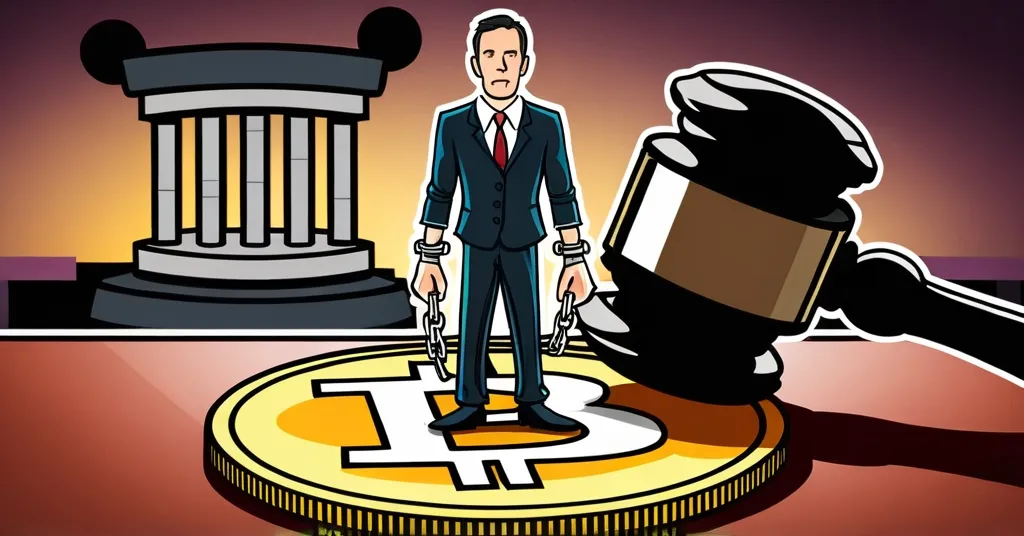Roger Ver Faces Extradition for Bitcoin Tax Evasion Amid Ulbricht’s Pardon

Roger Ver’s Extradition Looms for Bitcoin Tax Evasion, Igniting Calls for Ross Ulbricht Clemency
Roger Ver, the early Bitcoin advocate known as “Bitcoin Jesus,” faces potential extradition to the United States on charges of tax evasion related to his cryptocurrency earnings. This development has reignited the debate over the legal treatment of cryptocurrency pioneers, with Ross Ulbricht, the founder of Silk Road, recently receiving a presidential pardon and release from prison.
- Roger Ver faces extradition for tax evasion on Bitcoin earnings
- Ross Ulbricht pardoned and released, fueling fairness debates
- Ver’s legal troubles stem from unreported Bitcoin gains
- Ulbricht’s case prompts discussion on crypto-related legal actions
On February 15, 2024, a federal grand jury in the U.S. District Court for the Central District of California indicted Roger Ver on charges including mail fraud, tax evasion, and filing false tax returns. The core of the issue is Ver’s failure to report and pay taxes on significant Bitcoin gains, which resulted in a $48 million loss to the IRS. After renouncing his U.S. citizenship in 2014, Ver’s actions came under scrutiny, particularly the unreported sales of crypto assets worth $240 million in 2017.
Ver’s legal battle has sparked renewed interest in the case of Ross Ulbricht, who founded the online black market Silk Road. Operational from 2011 to 2013, the Silk Road facilitated over $200 million in illicit trade using Bitcoin. Ulbricht’s life sentence without parole was overturned when President Trump granted him a full and unconditional pardon on January 22, 2025, leading to his immediate release. This surprising development reflects a shift in cryptocurrency regulation and enforcement, suggesting a more favorable stance towards crypto pioneers.
The contrast between Ver’s potential extradition and Ulbricht’s release raises significant questions about the legal treatment of those who helped shape the cryptocurrency industry. Ver’s case highlights the challenges faced by early adopters as governments enforce tax laws on digital assets. Meanwhile, Ulbricht’s pardon serves as a beacon of hope for those advocating for more lenient policies towards crypto-related legal issues.
The irony of Ver’s situation is stark. Once a vocal advocate for Bitcoin’s potential to revolutionize finance, he now faces legal repercussions for his dealings in the very asset he championed. This situation underscores the tension between the decentralized ethos of cryptocurrencies and the traditional legal systems that seek to regulate them. The broader implications for the cryptocurrency industry are profound. As governments grapple with how to tax and regulate digital assets, cases like Ver’s serve as a stark reminder of the potential legal pitfalls for those involved in the space. The industry must navigate these challenges while advocating for clearer regulations and better tax compliance education.
While the tax evasion charges against Ver are serious, it’s important to consider the broader context. Cryptocurrency, and Bitcoin in particular, was designed to operate outside of traditional financial systems. The legal system’s struggle to adapt to this new paradigm often results in harsh measures against those who were early to the game. Ver’s case is a prime example of this clash. On the flip side, Ulbricht’s pardon, while a victory for the crypto community, should not distract from the reality that operating platforms like Silk Road involved serious illegal activities. The crypto world needs to grapple with these dual narratives: the push for innovation and freedom versus the need for legality and ethical conduct.
The narrative also serves as a reminder of the importance of understanding the legal implications of cryptocurrency transactions. The decentralized nature of Bitcoin and other cryptocurrencies can sometimes lead individuals to overlook traditional tax obligations, a mistake that can have severe consequences. For newcomers to the crypto space, this story is a cautionary tale about the importance of staying informed and compliant with tax laws.
At the same time, Ver’s case and Ulbricht’s pardon highlight the ongoing struggle for clarity and fairness in crypto-related legal actions. The cryptocurrency community, including Bitcoin maximalists, must continue to advocate for regulatory frameworks that balance the need for oversight with the innovative spirit of the industry. While Ver’s legal troubles are self-inflicted, they also point to a larger issue: the need for governments to provide clear guidelines on how digital assets should be treated for tax purposes.
The crypto world is watching these events unfold with bated breath. The journey of its pioneers is fraught with both triumphs and trials, and the balance between innovation and regulation remains a delicate dance. Each new development, whether a legal case or a regulatory change, shapes the future of this revolutionary technology.
Key Takeaways and Questions
- What is the current legal status of Roger Ver?
Roger Ver is facing potential extradition to the United States on charges of tax evasion related to his Bitcoin earnings.
- Why are Ross Ulbricht’s supporters calling for clemency?
Ross Ulbricht’s supporters believed his life sentence without parole was excessively harsh, leading to advocacy for his release, which was eventually granted through a presidential pardon.
- What does Roger Ver’s case imply for other cryptocurrency pioneers?
Roger Ver’s case suggests that early adopters and advocates of cryptocurrencies may face legal repercussions, particularly related to tax issues, as governments enforce regulations on digital assets.
- How does the narrative highlight the contrast between Roger Ver and Ross Ulbricht?
The narrative contrasts Ver’s potential extradition for tax evasion with Ulbricht’s recent release from prison after a presidential pardon, showcasing different legal outcomes for two prominent figures in the Bitcoin community.
- What broader implications does this situation have for the cryptocurrency industry?
The situation underscores the ongoing tension between the decentralized nature of cryptocurrencies and the regulatory frameworks of governments, potentially affecting how other cryptocurrency pioneers and businesses navigate legal and tax obligations.



